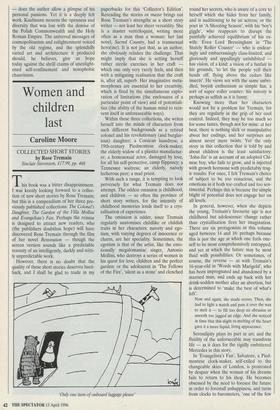Women and children last
Caroline Moore
COLLECTED SHORT STORIES by Rose Tremain Sinclair Stevenson, £17.99, pp. 468 This book was a bitter disappointment. I was keenly looking forward to a collec- tion of new short stories by Rose Tremain; but this is a compendium of her three pre- viously published collections: The Colonel's Daughter, The Garden of the Villa Mollini and Evangelista's Fan. Perhaps the reissue is designed to attract new readers, who (the publishers doubtless hope) will have discovered Rose Tremain through the film of her novel Restoration — though the screen version sounds like a predictable travesty of an intelligently, darkly and witti- ly unpredictable work.
However, there is no doubt that the quality of these short stories deserves hard- back, and I shall be glad to trade in my paperbacks for this 'Collector's Edition'. Rereading the stories en masse brings out Rose Tremain's strengths as a short story writer — not least her sheer versatility. She is a master ventriloquist, writing more often as a man than a woman: her last novel, Sacred Country, had a transsexual hero(ine). It is not just that, as an author, she obviously relishes the challenge. That might imply that she is setting herself rather sterile exercises in her craft which one only very rarely feels, and then with a mitigating realisation that the craft is, after all, superb. Her imaginative meta- morphoses are essential to her creativity, which is fired by the simultaneous explo- ration of limitations (the enclosures of a particular point of view) and of potentiali- ties (the ability of the human mind to rein- vent itself in unforeseeable ways).
Within these three collections, she writes herself into the minds of characters from such different backgrounds as a retired colonel and his revolutionary (and burglar- ious) daughter; a Corsican laundress; a 19th-century Piedmontese clock-maker; the elderly widow of a plastics manufactur- er; a homosexual actor, damaged by love, for all his self-protective, camp flippancy; a Tennessee waitress; an elderly, naively lecherous peer; a mad priest.
With such a range, it is tempting to look perversely for what Tremain does not attempt. The oddest omission is childhood, and children — so often the province of short story writers, for the intensity of childhood memories lends itself to a crys- tallisation of experience.
The omission is odder, since Tremain regularly anatomises childlike or childish traits in her characters: naivety and ego- tism, with varying degrees of innocence or charm, are her speciality. Sometimes, the egotism is that of the artist, like the emo- tionally megalomaniac singer, Antonio Mollini, who destroys a series of women in his quest for love, children and the perfect garden; or the adolescent in 'The Fellows of the Fire', 'silent as a stone' and clenched `0114) one item of onboard luggage please' round her secrets, who is aware of a core to herself which she hides from her family, and is auditioning to be an actress; or the poet in `A Shooting Season', with his 'boy's giggle', who reappears to disrupt the painfully achieved equilibrium of his ex- wife. Even Lord Bressingham in 'The Stately Roller Coaster' — who is endear- ingly and embarrassingly class-limited, and gloriously and appallingly uninhibited has vision, of a kind: a vision of a funfair in his grounds, `to let the people yell their heads off, flying above the cedars like insects'. He views sex with the same unbri- dled, boyish enthusiasm as simple fun, a sort of super roller coaster: his naivety is perhaps as selfish as it is funny.
Knowing more than her characters would not be a problem for Tremain, for they are regularly in the grip of her cool control. Indeed, they may be too much so for some tastes, though not for mine: at her best, there is nothing slick or manipulative about her endings, and her surprises are almost never mere twists. Yet the only story in this collection that is told by and about children is the least satisfactory: `John-Jin' is an account of an adopted Chi- nese boy, who fails to grow, and is injected with growth hormone with predictably trag- ic results. For once, I felt Tremain's choice of subject to be too conscious, and the emotions in it both too crafted and too sen- timental. Perhaps this is because the simple blight of potential does not engage her on all levels.
In general, however, when she depicts the young, Tremain's favourite age is not childhood but adolescence: change rather than crystallisation fires her imagination. There are six protagonists in this volume aged between 14 and 16: perhaps because this is just the age at which one feels one- self to be most comprehensively entrapped, and yet at which the future may be most fluid with possibilities. Or sometimes, of course, the reverse — as with Tremain's 16-year-old in 'Words with Marigold', who has been impregnated and abandoned by a married man, and ends up back with her drink-sodden mother after an abortion, but is determined to 'make the best of what's left'.
Now and again, she made errors. Then, she had to light a match and pass it over the wax to melt it — to fill too deep an abrasion or smooth too jagged an edge. And she noticed in time that this slight re-melting of the heart gave it a more liquid, living appearance.
Serendipity plays its part in art; and the fluidity of the unforseeable may transform life — as it does for the rigidly embittered Mercedes in this story.
In 'Evangelista's Fan', Salvatore, a Pied- montese clock-maker, self-exiled to the changeable skies of London, is prostrated by despair when the woman of his dreams fails to return to his shop. He becomes obsessed by the need to foresee the future in order to forestall unhappiness, and turns from clocks to barometers, 'one of the few scientific devices man has perfected that can tell us what is going to happen.' He re- invents his profession, his name, and even his love — imagining that his beloved's fan hid repellent imperfections. Yet such her- metically-sealed constructions may prove too fragile to cope with the infinitely varied permutations of experience.
The barometer provides a convenient image for Tremain's own art: mercurial and fluid experience imprisoned (for the duration of the story) in the transparencies of her style. When a writer is as good at her craft as Tremain, it is possible to feel the glass to be imprisoning, and the stories merely 'well-crafted' — high praise, with faintly repellent associations. This is sel- dom the case. Tremain's control, her artis- tic poise, has within it a fine awareness of its own possible fragility. She is aware of the limitations (as well as the potentiali- ties) of her craft, which is one reason why she is, at her best, a very fine writer indeed.



































































 Previous page
Previous page